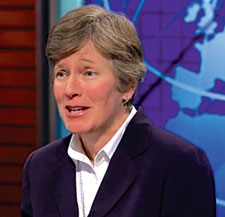
Mary L. Bonauto, civil rights project director for Gay & Lesbian Advocates & Defenders (GLAD)
Photo: YouTube
By: Chuck Colbert /TRT Reporter—
BOSTON, Mass.—On the same day the governor signed legislation making same-sex marriages legal in Illinois and the Catholic bishop of Springfield, the state capital, offered prayers of exorcism in Latin during a worship service in opposition to the law, LGBT residents of Massachusetts were celebrating the decade-old Goodridge decision, an historic high court ruling that ushered marriage equality into the Commonwealth and nation.
The occasion was marked by a lecture given November 20 by Mary L. Bonauto, civil rights project director for Gay & Lesbian Advocates & Defenders (GLAD), titled “The Goodridge Decision: 10 Years Out.” The event was held at the Old South Meeting House, located in downtown Boston. Ten years ago, Bonauto argued on behalf of GLAD’s seven plaintiff couples before the state’s Supreme Judicial Court (SJC), which on November 18, 2003, issued its Goodridge v. Department of Public Health ruling in favor of them.
“[Goodridge] held gay people up in this state and across this nation, and I think forever transformed any effort to try to create equality for gay people judged against the standard of ‘Is it really equal? Is it really the same standard?’” Bonauto said.
It was a multi-media lecture, featuring a slide-show presentation and video testimonials to the positive effects of Goodridge and its subsequent ramifications. The video is titled “Goodridge at 10: Celebrating a Landmark Ruling and a Decade of Marriage Equality.”
“The decision and its courage caused people to rally behind its core principles of dignity, liberty and equality for all people, even in the context of marriage,” Bonauto said, addressing a gathering of about 100 or more people. “Goodridge is the one that broke that historic barrier. Goodridge, in my view, has made all the future progress that we had possible.” [pullquote]“Goodridge is the one that broke that historic barrier. Goodridge, in my view, has made all the future progress that we had possible.” — Bonauto[/pullquote]
In her remarks, Bonauto was referring to attempts by the Massachusetts Legislature and others, as well as state courts and other legislative bodies, to create separate but inherently unequal civil-unions or domestic-partnership provisions.
Bonauto read portions from the decision; perhaps its most often cited passages, some of which are read at same-sex wedding ceremonies:
“Marriage is a vital social institution. The exclusive commitment of two individuals to each other nurtures love and mutual support; it brings stability to our society. For those who choose to marry, and for their children, marriage provides an abundance of legal, financial and social benefits. In return it imposes weighty legal, financial and social obligations. The question before us is whether, consistent with the Massachusetts Constitution, the Commonwealth may deny the protections, benefits and obligations conferred by civil marriage to two individuals of the same sex who wish to marry. We conclude that it may not. The Massachusetts Constitution affirms the dignity and equality of all individuals. It forbids the creation of second-class citizens. In reaching our conclusion we have given full deference to the arguments made by the Commonwealth. But it has failed to identify any constitutionally adequate reason for denying civil marriage to same-sex couples.”
The author of Goodridge, then Chief Justice Margaret H. Marshall, continued in her opinion, “We are mindful that our decision marks a change in the history of our marriage law.”
As Marshall explained, “The marriage ban works a deep and scarring hardship on a very real segment of the community for no rational reason.” She also wrote, “The absence of any reasonable relationship between, on the one hand, an absolute disqualification of same-sex couples who wish to enter into civil marriage and, on the other, protection of public health, safety, or general welfare, suggests that the marriage restriction is rooted in persistent prejudices against persons who are (or who are believed to be) homosexual.”
In the short video clip, Marshall spoke on camera about a “poignant” Goodridge moment she had with a work colleague who told her, “I always thought I knew who I was until I read this decision.” [pullquote]At the same time, Governor Mitt Romney did everything in his power to derail Goodridge until voters in 2006 elected Deval Patrick, an ardent backer of LGBT rights and marriage equality.[/pullquote]
“I think we shouldn’t overlook what gays and lesbians and transgender people have had to face in their real lives in the past,” said Marshall.
The former chief justice also spoke in the video to the power of marriage equality in real life. At a same-sex marriage, Marshall explained, people see “what they see at every marriage: People in love, people are happy, walk down an aisle, usually. Sometimes you stamp on a glass. Other times you don’t. Somebody says: ‘Kiss the spouse. Kiss the groom. Kiss the bride.’ People kiss. Clap, clap.”
Of course, Goodridge infuriated opponents of LGBT equality, as Bonauto detailed in her talk. Multiple state and federal lawsuits attempted to block its implementation. Nevertheless, Massachusetts began issuing marriage licenses to same-sex couples May 17, 2004. Still, until 2007, state lawmakers deliberated in a dozen and-a-half special sessions, called Constitutional Conventions, proposing measures attempting to place anti-gay marriage bans before voters—all of which failed. At the same time, Governor Mitt Romney did everything in his power to derail Goodridge until voters in 2006 elected Deval Patrick, an ardent backer of LGBT rights and marriage equality.
“The message was received,” Bonauto said. “Marriage would not remain an island in Massachusetts. It was here to stay.”
In fact, 16 states and the District of Columbia today allow same-sex couples to marry under civil law, including all six New England states, as well as New York, New Jersey, Maryland, Delaware, Iowa, Illinois (effective June 1, 2014), Minnesota, California, Washington, and Hawaii. On top of these gains, earlier this year the U.S. Supreme struck down a key provision of the 1996 Defense of Marriage Act (DOMA), which barred legally married same-sex couples from receiving more than 1,000 benefits under federal law. The high court also restored marriage equality in California, denied for more than four years by Proposition 8.
The date of Bonauto’s lecture coincided with Transgender Day of Remembrance. Accordingly, she mentioned the unfinished business of transgender equality, along with the need for federal workplace protections on the basis of sexual orientation and gender identity, stronger anti-bullying measures at the state and local levels, financial resources for homeless gay youth and gay seniors, and educational resources and funding for HIV/AIDS prevention and treatment, among other pressing concerns effecting the entire LGBT community.
On hand for Bonauto’s lecture was Charles Martel, who advocated for same-sex marriage from a lay Catholic perspective as a co-founder of Catholics for Marriage Equality.
“After ten years of marriage equality, we have come to see the positive impact that people of faith have had in supporting this movement throughout the country,” Martel said. “And in particular, the Catholic laity has played a very significant role in bringing this to reality—despite the UDS bishops’ opposition.”
In her lecture, Bonauto singled out former state Senator Marian Walsh, a high-profile lay Catholic for her courage in defending Goodridge despite, by her own acknowledgement, its being “out of my comfort zone.”
Several Goodridge plaintiffs were on hand to hear Bonauto speak, including Hillary and Julie Goodridge, with their daughter Annie, now a high school senior.
“As a plaintiff, I’ve been speaking to people in other parts of the country who are in their twenties and do not understand the significance of ten years of marriage,” said Julie. “They have always had marriage in their lifetime and don’t see it as a big deal.”
She wondered, “How do we keep the momentum going? When does history just become history rather than a growing movement.”
“It’s wonderful to be here,” said Hillary. “I expect the next ten years to bring enormous changes and am so appreciative of what Mary said about the interplay of the political, legal, judicial, legislative, and public opinion pieces that were such a wonderful storm here in Massachusetts.”
As Bonauto said earlier in her talk, “Goodridge was a triumph of all three branches of government—and for the people of Massachusetts.”
The Goodridges separated amicably in 2006 and were divorced in July 2009.
© Copyright. Chuck Colbert. All rights reserved.







